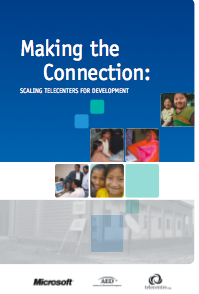CASE STUDY: EXCERPT FROM MICROSOFT/AED EVALUATION OF TELECENTERS
 E-Centers of Kyrgyzstan - Enhancing Cybercafes' Traditional Menu of Service
E-Centers of Kyrgyzstan - Enhancing Cybercafes' Traditional Menu of Service
Local Environment
Without the advantage of oil revenue or other marketable natural resources, Kyrgyzstan’s development has been modest in comparison to resource-rich countries such as neighboring Kazakhstan. Recent political turmoil underscores the need to create better communication linkages between rural areas and larger cities. More than 60 percent of Kyrgyzstan’s population lives in rural areas where many subsistence farmers struggle to find potable water.
Organizational Model
Kyrgyzstan’s e-Centers are unique in several ways. While they were developed as a donor-supported pilot initiative with USAID funding, they were planned from the start within a for-profit framework. Rather than being established within local NGOs or local institutions, they were set up within existing cybercafés, based on a competitive tender process.
e-Centers reversed the traditional path of not-for-profit telecenters charging for services to become financially sustainable by starting with profitable cybercafés and increasing their capacity to provide high-value services such as videoconferencing, e-Learning, and others geared to serving the needs of economically depressed rural areas with high unemployment rates.
Services
The e-Centers leverage the high demand for “infotainment” services such as computer games and other forms of online entertainment, which are highly profitable and allow the operator to pay staff and overhead costs. e-Center services, offered separately (in a different room), were funded initially by USAID. Microstipends or vouchers, used for training purposes, were distributed in the community to stimulate demand for the new services.
Most training starts with basic computer literacy and guided access to training courses in Internet- and multimedia-related services such as macromedia web design and other digital media skills now in demand. e-Centers also offer web-based certification for accounting courses and other business capacity-building skills.
This training is unique in Kyrgyzstan because it seeks to create 21st-century skills and potential and offers a nontraditional source of revenue into which rural communities can tap.
Replicability, Expansion of Services, and Scalability
The initial success of the project has attracted additional support from the International Telecommunications Union (ITU), which has allocated resources to open 16 additional e-Centers. The ITU-funded e-Centers follow the USAID-funded pilots’ structure and will add an e-Government pilot component.
The e-Government component is intended to increase government transparency in rural areas and establish online resources and applications to improve delivery of government services in rural areas, including permits, tax filings, government information, and distribution of social benefits.
